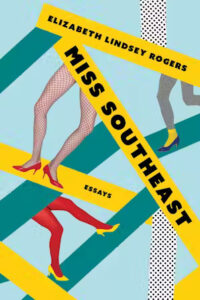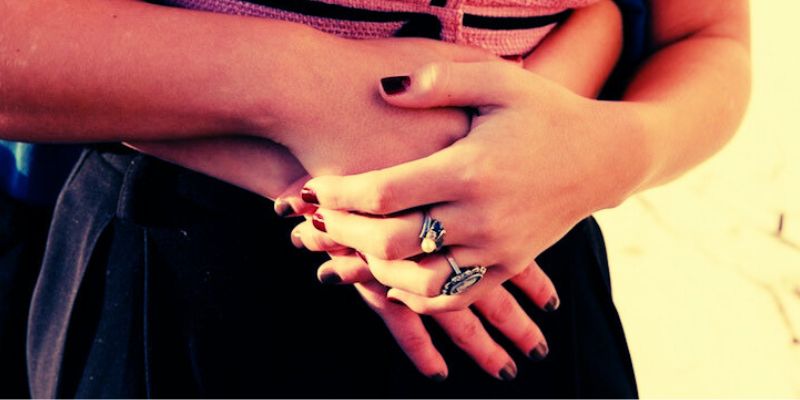Consent and Power: On Age Gaps in the Context of Queer Relationships
"To be a woman, even a woman in a position of power, means an erasure of agency, even the agency to harm. For better or worse, we were both invisible."
My oldest sister’s precocious tastes included a fascination with scandal, as well everything British, including Maggie Smith. The Prime of Miss Jean Brodie was one of her favorite movies, an odd choice for a mid-90’s teenager. It follows a group of precocious Scottish schoolgirls and the flawed adults who mentor them. We loved the 1930s wool dresses, the accents, the adultery. At the narrative crux, Sandy—the smartest of Miss Brodie’s students—admits to Miss Brodie that she’s having an affair with Teddy Lloyd, the forty-two-year-old art teacher. To unsettle our parents, perhaps, my sister sometimes walked around the house parroting Sandy’s famous declaration. “You see,” my sister said in an Edinburgh accent, “I am Teddy’s lover.” Her younger sisters laughed hysterically, convinced she was a comic genius.
When I saw Prime as an adult, it was even racier than I remembered it. Rather predictable, however, is Miss Brodie getting fired for “unconventional teaching methods” (which, to be fair, include narcissistic hero worship and promoting fascism), while Teddy faces no consequences for his indiscretions. Sandy is only seventeen when she begins to model for Teddy and they start having an affair. Teddy seems to feed into that prevailing mythology about creative men and how they require inspiration from underaged girls.
She had been my first love, but to her, I was just another devoted student, passing through her orbit en route to my adulthood.I was fifteen the year I read The Prime of Miss Jean Brodie, Muriel Spark’s original novel, which I’d found in my school’s library. That was also the year I also met the Guitar Teacher. The Guitar Teacher was your classic charismatic educator. Thirty-six years old, she was one of those iconoclast musicians who’d figured out how to turn herself into a professional. Like everyone else in my high school guitar class, I was obsessed with her. She was from the mountains but had the veneer of a classical musician who was conservatory educated. She could play almost any pop song you could think of from memory, but also Bach, Paganini, contemporary composers. A modern-day troubadour, she spent her days commuting between high schools and her evenings teaching undergrads. She rode a motorcycle on her days off. Of course.
I started coming to class early. The Guitar Teacher was teaching me how to shape my fingernails for tone production. “It’s necessary,” she said, “if you’re serious about the instrument.” Taking my right hand in her hand, using her file and the finest-grade sandpaper, she knew the exact angle and length that each nail needed to be in order to get the richest sound possible on the strings.
Literal grooming.
I was a mediocre guitarist: nervous all the time, my hands shaking. Under my teacher’s influence, however, I progressed quickly on the instrument, moving from two-liners to more advanced études within the year. Then real repertoire: baroque suites, moody modern compositions in shifting meters. The Guitar Teacher took a special interest in me, her brow furrowed in concentration as she watched my hands. “How did you learn to make a rich tone like that?” she’d ask, ignoring any mistakes or buzzes coming from my troublesome left hand.
The verdict: I was talented enough, or at least had enough potential, to become one of the few the Guitar Teacher took for private study outside of school. “Make it worth my while,” she said, commanding and beckoning at the same time. “You’ll have to work your butt off for me.” Thus began the idea that she had done me a favor, that I owed her something for what she had invested.
After auditioning for All-County Guitar Ensemble when I was sixteen, a group of guitar teachers listening from the other side of a privacy screen, I was awarded first chair unexpectedly. The dark horse, I had out-seated everyone: cocky senior boys whose hands zipped across the fretboard; city kids who’d been studying guitar since they were little.
Elated, the Guitar Teacher called me with the news. “I told you,” she said. “I’m not the only one who knows you’re gifted.” She paused. “Do you know you’re the first girl to ever be first chair?”
The Guitar Teacher’s professional history was one of men. All of her teachers, classmates, most of her students. “And you’re not just some random girl who got this,” she went on. “You’re my girl.”
My girl, I repeated to myself. The possessive language startled, then intrigued me with its ambiguous possibilities. Imagine belonging to a woman like the Guitar Teacher. I floated through hallways, suddenly feeling recognized. Visible. Intuitively, I knew that this was the season everything would change.
*
The following week, she invited me to carpool with her and one of her college students to a concert in the next town. It was February, unusually cold for North Carolina. I ducked into the student’s Subaru, the heat blasting. The Guitar Teacher had taught this particular college student since he was a kid—she had a way, I’d learn, of making people lifelong apprentices—and they knew each other well, joking and laughing. The three of us talked over and under the Bach on the stereo, our voices mimicking the frenzied arpeggios. “Baroque rock and roll,” the Guitar Teacher proclaimed. I was alone in the middle of the back seat, leaning forward so I could hear them. The Guitar Teacher was in the passenger’s seat. “Your hair smells good,” she said. Then, in a dark stretch of highway, she reached her hand across the console and behind her, resting it on top of my hand.
For guitarists, I would argue, nothing is as intimate as touching hands. The hands are the world. She had touched mine while adjusting them in lessons, while doing my nails. But this was different. I felt a starry sensation under the surface of my skin. For a few minutes, I sat still, unsure of what to do.
No, I reasoned. She wouldn’t.
But on the ride back from the concert, she got bolder. Her hand reached my knees, down the outside of my calf and into my sock, her index finger teasing the arch of my foot. I grew warm under my clothes. The college student drove on, oblivious to what was behind him.
At the end of the night, he dropped off two of us near the Guitar Teacher’s office at the college. She and I stood beside my old white Volvo sedan, glowing in the dark parking lot. We were alone. An enormous oak, a tree from another century, cast a lacy black shadow at our feet. There was light coming from somewhere I couldn’t place. The Guitar Teacher reached down—she was eight inches taller than I was—and placed her hand on my coat collar. Her finger brushed the side of my neck. “So,” she said, as if already in the middle of a conversation, “You’re OK?”
“Yes,” I replied, although I wasn’t sure.
She came toward me then, her lips brushing my cheek, what seemed habitual. But she’d never done this before. I looked up. “You look nice in this color,” she said. It seemed that she wanted to say more, but she was withholding something. “You should get home now. OK?”
The Guitar Teacher turned away, her lanky, black-shouldered figure blending with the oak’s huge shadow. She headed toward the front of the building where employees parked their cars. The light catching her hair was the last thing I saw before she disappeared.
It would take me until the next time to realize that I hadn’t made the whole thing up.
*
A hand on my lower back during a concert. Her fingers teasing my knees as she talked to me at the end of my lesson. Calls to my cell—the little flip phone my parents had given me for emergencies—just after we’d seen each other in public. That shirt you’re wearing today is distracting, she joked. Boundaries were crossed so slowly that I couldn’t put my finger on them: a hallmark, I realize, of what it means to be groomed. We pretended that the twenty-one year gap between us had no moral consequences, was just another function of tyrannical normativity. “Age difference,” she said once, “matters less and less as you get older.”
The Guitar Teacher told me about her lovers when she was my age: a college student, the head majorette. Once, the drama teacher at her high school, who was married and closeted. We held hands. She moved her fingers through my hair, over each ear, down my spine, alongside my small breasts. On the first warm day of the spring, she teased me by reaching into my jeans, snapping my underwear’s elastic.
I turned seventeen. She taught at a summer program for high school students in another state, meaning I wouldn’t see her for seven weeks in July and August. At my last lesson before she left town, we drove around town afterwards. It was hot, and both of us wore shorts. Without warning, she reached over and down between my legs. Here, the Guitar Teacher was clumsier, rougher than I imagined she’d be, given how precise she usually was with her hands.
I braced myself, as if for a blow. Around us, the green leaves blurred in the windshield, the sun searing through the glass. Everything now moved at a speed I couldn’t reckon with.
*
I suppose I shouldn’t have been surprised that no one—not my family, people at school, or even the Guitar Teacher’s partner—really suspected. To be a woman, even a woman in a position of power, means an erasure of agency, even the agency to harm. For better or worse, we were both invisible.
*
The Guitar Teacher’s rules never made sense. She refused to kiss me on the mouth, as if that most basic illicit act would finally brand us. “I’m waiting until you’re eighteen,” she told me, unveiling the shakiness of her logic. She revised her statement, finally remembering she was partnered with someone else. “Or,” she clarified, suddenly principled: “I guess would be waiting until then. If things were different.”
But she had not waited. The fact that she didn’t kiss me, or that she’d never actually get in a bed with me in earnest, didn’t absolve her. What was the difference? By the time I was seventeen, there was nowhere left on my body that she hadn’t touched. The next spring when I finally turned eighteen, that supposed threshold of adulthood: Would I really be such a different person than I had been before?
*
Was I now old enough to have an affair, I wondered, the way that Sandy had in The Prime of Miss Jean Brodie? If I just waited until I was a bit older, I reasoned, perhaps the Guitar Teacher and I would have a better chance at real romance. Perhaps she’d even leave her partner for me. “The age difference matters less and less as you get older,” she’d said the year before.
Maybe she’d really meant what she’d said about me turning eighteen.
But my eighteenth birthday passed uneventfully, the Guitar Teacher busy with work, making a five-minute call to my cell phone as she drove home. It had been months since anything sexual. She no longer made a point to be alone with me outside of lessons.
I was beginning to see the writing on the wall. I was leaving for music school at the end of the summer: a place that the Guitar Teacher had helped me access with her knowledge and teaching, a direction I’d never have gone without her. But the Guitar Teacher was biding her time. She was doing whatever it took to erase what had happened. To the Guitar Teacher, I began to realize, I had no lasting impact. She had been my first love, but to her, I was just another devoted student, passing through her orbit en route to my adulthood.
I want to believe it’s self-knowledge that finally determines whether any relationship with an older person is instructive, judicious, plain abusive, a mix, or none of the above.She was an androgynous Teddy Lloyd with a guitar strapped to her back.
*
Some days, when I’m not thinking straight from the wound, part of me is tempted to reframe this as a bildungsroman. For better or worse, what happened with the Guitar Teacher was a pivot point: I emerged from the closet, unashamed. One version of truth, however incomplete, is that the Guitar Teacher helped me open a window into the rest of my life, a life in which I could question assumptions, embrace differences. Could I write this story as one where the older woman ushers a younger woman (OK, girl) into an erotic life, helping her to see a future of belonging after childhood years of feeling set apart, full of embarrassing longing?
Even under the gauzy gaze of my reminiscence bump—what psychologists call that period from adolescence where we seem to remember everything, assign it more value than other parts of our life—what happened in my teens is not so easily redemptive. But I’m curious whether someone else’s story of someone older could be. I also wonder, perhaps irresponsibly, perhaps too theoretically, if things are different for gay people, whether some queers have a sort of automatic peerdom that overrides age difference.
Queer theorists have been making this argument for decades. Scholar Gayle Rubin’s influential “sex hierarchy” concentric circle drawing puts cross-generational relationships in the same “bad outer limits” as other taboo categories: homosexuality, non-procreative, and solo and group sex, among others. She’s making the point that these experiences are deviations from the norm rather than harmful. Because we are a smallish tribe, because we don’t follow to the heteronormative reproduction mandates, because we have been throwing off binaries and embracing polyamory and kink for centuries: could it mean that queer shifts relationship paradigms entirely, which also means taboos about generational difference?
In my experience, many queer folks seem to think that an age gap—even one that is traditionally considered abusive—isn’t inherently unhealthy, even early on. Once, when I mentioned my early experience with my teacher to a gay friend, he said he’d had a similar thing with an older man his teens. But he didn’t use the words abuse or statutory rape. “Normal in gay world,” he reasoned. “I mean, how else are you supposed to learn?”
But I wonder whether we queers are being honest with ourselves. Perhaps our acceptance of the someone-older phenomenon is because we’ve reinvented or queered what age difference means. But it seems just as likely that we’re not examining it closely. Maybe we’re just buying into the same patriarchal crap as the heterosexual world, the tradition that says that the only agency youth have comes from wielding sex appeal. Perhaps we’re just making excuses for abusive behavior, repeating a tired song in a different key.
In the end, no theory quite holds across the board. I want to believe it’s self-knowledge that finally determines whether any relationship with an older person is instructive, judicious, plain abusive, a mix, or none of the above. It also seems possible for the balance of things with someone older, to evolve over time, even if the origins seem questionable.
Still, for each harmonious ending, there are too many others that go something like this: Older person meets young person. Older person is careless with their power and/or denies having it. Young person almost loses everything in the process.
Even Sandy, Teddy’s young muse and lover, comes to realize that she was invisible all along: Teddy really wanted Sandy’s older mentor, Miss Brodie. He’s used Sandy as a replacement, knowing she’s young and susceptible to his wiles.
“As this seems to be a time for truth,” Sandy eventually tells Teddy, “You’re quite a mediocre painter. I wonder you don’t try some other line.”
She then delivers the washed-up artist a zinger: “You are getting on, you know.”
It’s the kind of line that only a wronged seventeen-year-old can deliver.
__________________________________

Excerpt from Miss Southeast by Elizabeth Lindsey Rogers. Copyright © 2024 by Elizabeth Lindsey Rogers. Forthcoming from Northwestern University Press/Curbstone Books.




















